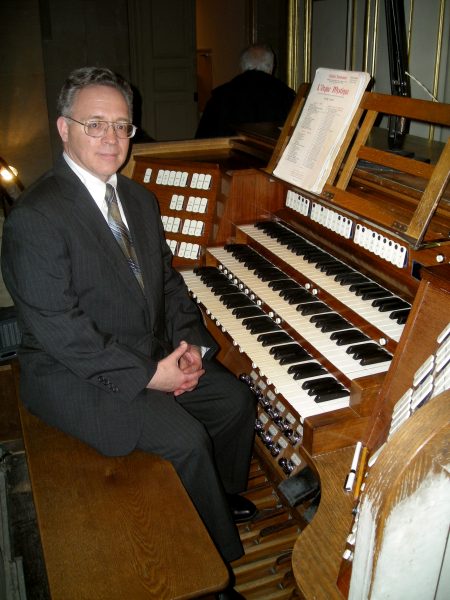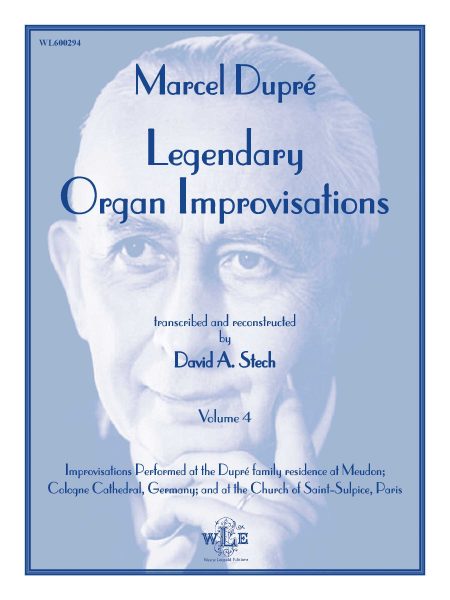UAF's Stech works to revive classic organ compositions
September 14, 2016
Hannah Hill
907-474-2417

Few people can appreciate the long and venerable career of French organ maestro Marcel Dupré as well as University of Alaska Fairbanks Professor of Music Emeritus David Stech.
Stech has spent the past several decades dedicated to the challenge of transcribing Dupré’s legendary pipe organ performances to musical notation, through critical study of rare archived recordings. These published works allow modern organists to recreate the improvisational genius of one of the world’s foremost organ virtuosos.
A prolific composer, Dupré’s oeuvre included a series of 76 chorales and 65 opuses. Several of the composer’s most famous published works were originally concert improvisations, which he later transcribed. His mastery of the spontaneous sets Dupré apart. As an improviser, Dupré synthesized musical creativity, technical prowess and practical exercises into masterfully complicated scores. For years, many of these pieces existed only as recordings of the original performances.
Stech served as a member of the UAF Music Department from 1972 until his retirement in 2007. Stech consulted on the installation of UAF’s own pipe organ in the Davis Concert Hall. During his tenure at UAF, Stech studied and taught many of the same subjects — counterpoint (the art of writing and/or playing a melody simultaneously with another, adhering to set rules), harmony and structural form — that Dupré himself studied at the Paris Conservatoire.
His interest in Dupré’s work came early, when Stech was studying organ performance in high school. Stech went on to earn a bachelor’s degree in music from the University of Minnesota-Duluth, a master’s in music from the Ohio State University and a doctorate in music from Michigan State University, where he studied music theory, harmony and structural analysis. During his college years, Stech carefully analyzed all of Dupré’s solo pipe organ compositions, igniting his interest in the French organist’s work.
Dupré was born in the spring of 1886 in Rouen, France. A child prodigy, he gave his first organ recital at age 10, and, at age 15, he composed an oratorio — a large production of voice and orchestra, performed without theatrical staging.
Dupré solidified his professional prominence in 1920 with a legendary series of 10 recitals in which he played Bach’s complete works for organ entirely from memory. During this early part of his life, Dupré built his international reputation by performing more than 2,000 recitals across Europe, Canada, the United States and Australia.

Starting in the mid-1990s, Stech began the labored process of finding and transcribing Dupré’s music. Before Stech’s work there were no written scores for these pieces — only the rare physical recordings of the performances. Stech found original sources in university libraries, in broadcast archives of European television and radio shows, with private individuals and at music societies. He spent four years negotiating with Dupré’s descendants for exclusive international publishing rights of his reconstructed musical scores. In 2001, Stech published the first set of reconstructions of Dupré’s improvisational works.
Paul Krejci, a member of the UAF Music Department faculty, said Stech's “noteworthy transcriptions serve as a bridge between the auditory and visual realms of music. Ultimately, Stech's work demonstrates on a fundamental level the value of listening and transcribing. Furthermore, his work highlights the importance of the organ — the king of instruments — in human history, emphasizing the organ's role as a scientific tool in examining the physics of sound, its impact as a source of spiritual inspiration and social entertainment, and its long-held tradition in cultivating the art of registration and improvisation.”
Stech describes the process as “an exercise in advanced music dictation." His first transcriptions were done without the benefit of today’s sound editing technology. Even with technological advances, Stech noted, there is no “tool that can do what the human brain does with respect to translating sound into traditional music notation.”
To transcribe Dupré’s improvisations, Stech studies each recording carefully, listening to each successive phrase, sometimes shorter than two seconds at a time, and drafting his first impressions using notation software. He then listens to the playback rendition of his reconstruction, juxtaposing those results to the original recording of Dupré’s performances. This side-by-side comparison allows discrepancies to be immediately noted and fixed. Stech then plays the transcription at the organ to check its playability.
Krejci said Stech’s teaching and research uses several musical skills — a highly trained ear able to distinguish a diverse array of tones, harmonies, rhythms and timbres; the proficiency to notate such musical elements on paper using traditional staff notation and computer software; and the technique to reproduce such information by playing it back on a keyboard instrument.
Krejci suggested that the transitory nature of music is another reason to celebrate Stech’s achievement, “In a visually dominant society, we often forget to actively listen to sounds in our environment, let alone musical ones. Sounds, however, are fleeting unless they are recorded.”
Seven volumes of Dupré’s music are currently in print though Wayne Leupold Editions, with another three planned in early 2017. The sixth volume will be performed, in its entirety, at the Catholic Cathedral in Los Angeles on Jan. 18, 2017. It is due to Stech’s unique project, Dupré’s innovative and challenging improvisations are being played across the world for the first time since their original performances.
A sample of one of Marcel Dupré's compositions, as transcribed by David Stech: wav="//news.uaf.edu/wp-content/uploads/2016/09/F64-pr-amped.wav"


